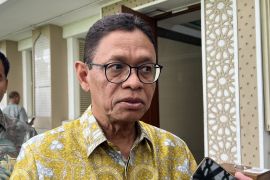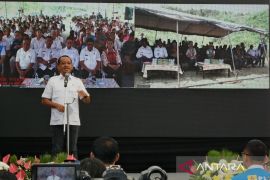"The subsidy for electricity has almost reached Rp100 trillion."Jakarta (ANTARA News) - The government will impose a quarterly 4-percent automatic power rate hike beginning January next year in an effort to reduce swelling subsidies in all sectors, which will reach Rp316.1 trillion in 2013.
President Susilo Bambang Yudhono told the Parliament on Thursday that the government was planning to increase subsidies by Rp23 trillion, which will see the state budget rise from Rp268.1 trillion to Rp316.1 trillion in 2013.
The amount of the subsidy just for electricity in 2013 was set at Rp80.9 trillion, which increased from Rp65 trillion in 2012. "The government is proposing to the Parliament its plan to reduce the power subsidy burden through an automatic electricity rate hike every quarter beginning next January 2013," the president said.
However, the president did not mention the percentage of the automatic tariff increase, but he said the total subsidy for the power sector next year was set at Rp80.9 trillion.
Further, Deputy Minister for Energy and Mineral Resources Rudi Rubiandini said earlier that the government was planning to increase the electricity tariff by 10 percent next year, which would be done in stages. "We are determined to raise it," he asserted.
According to President Yudhoyono, many countries had implemented the system of gradual and automatic increases so consumers would not feel too heavy a burden, as compared to an increase carried out during a single year.
Meanwhile, Minister of Energy and Mineral Resources Jero Wacik said that the electricity subsidy has continued to increase and has become a burden on the state budget, so it should be reduced by raising power rates for upper-class consumers.
"The subsidy for electricity has almost reached Rp100 trillion, so we need to hike the electricity tariff to reduce the burden," Jero Wacik said during a press conference.
He noted that the electricity subsidy has so far assisted many consumers in the middle and upper classes, while at the same time many poor people in various regions still do not have electricity, so the large subsidy for higher class consumers should be reduced.
"The number of the middle class has increased to more than 56 percent, so the government will reduce its electricity subsidy to them," said Wacik.
Even though the government has determined to increase the power tariff, Jero Wacik remains cautious in responding to matters regarding the people`s purchasing power.
"The subsidy must be provided and reach its real target, consumers of the 450 KVA type will be provided the subsidy, but consumers having over 450 KVA should no longer enjoy a large subsidy. There will be no subsidy for consumers having 6,000 KVA and over," the minister said.
Additionally, the government is also making efforts to produce new and renewable energy on a massive scale, using gas, coal, geothermal, solar and bio mass energies. "Yesterday, I signed a decree to increase the investment in geothermal development. We will provide larger funds for the development of geothermal," he said.
In line with the development of other alternative energies, the government will gradually raise electricity tariffs, which are to be carried out in phases.
That`s why the electricity tariff would be raised in phases every three months to cut energy subsidies and phase out the electricity subsidy for users with a capacity of 6,000 KVA.
"An increase of 4 percent every quarter would not be too much of a burden," Wacik said.
He described a 4 percent increase in the electricity tariff as realistic, saying it would be acceptable to the public and the government. Further, implementation of the policy throughout the country would result in a large reduction in the subsidy.
The plan is being discussed at his ministry, where officials will consider the purchasing power of the public before making a decision. Middle to high income citizens who do not deserve a subsidy are the ones who gain most from the electricity subsidy, as they are the largest users of electricity.
"The subsidy policy must not be off target," he said. Households with electric consumption of 450 watts will continue to be subsidized, but the subsidy would be abolished for those using more than 6,000 watts, he added.
It is unfair that a resident who has a home with a swimming pool that needs a high power supply should be subsidized.
"We have already thought about how to reduce the subsidies," he added. After all, most subsides, including fuels subsidies, were enjoyed by upper class people.
Based on a University of Indonesia survey, 77 percent of the subsidized fuel is consumed by upper-middle-class citizens. Therefore, the government must take steps to reduce the subsidies
Further, Wacik stated that the government must increase fuel prices and electricity rates in order to reduce the burden of subsidies on the 2013 state budget.
"Subsidies can be diverted to other, more important things, such as infrastructure, health, and education," he pointed out.
Meanwhile, head of the Fiscal Policy Agency of the Finance Ministry, Bambang Brodjonegoro, said when raising the electricity tariff officials needs to consider inflation, which might follow as a consequence, and the purchasing power of the public.
"The plan should not trigger a surge in inflation that would place a greater burden on consumers," Bambang said.
Yet, according to Finance Minister Agus Martowardojo, an additional fund of Rp12 trillion could be raised every year for infrastructure projects as a result of the planned increase in the electricity tariff.
"Assuming that the electricity tariff is raised by 3 to 4 percent every quarter starting January 2013, there will be an addition of Rp12 trillion per year," Agus told reporters.
He said the Rp12 trillion funds expected from the increase in the electricity tariff has not yet been included in the capital spending of Rp193.83 trillion set in the draft state budget proposed by the government on Thursday to the parliament.
The plan to cut subsidies on electric energy has yet to be discussed, including with the House of Representatives.
"The government has to set aside a large fund for subsidies at the expense of social and infrastructure spending," he said.
(T.A014/INE/KR-BSR/O001)
Reporter: by Andi Abdussalam
Editor: Priyambodo RH
Copyright © ANTARA 2012












